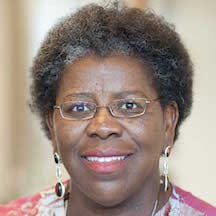
by Angela Mae Kupenda

The decision in the landmark U.S. Supreme Court case Brown v. Board of Education, turns 65 years old in 2019. While 65 is considered to be a normal retirement age, Brown was retired many years ago while it was still just a toddler. As a result, Brown never became all that it could be. Now as Brown turns 65, it is (past) time to bring Brown out of its early, premature retirement.
Almost 65 years ago the monumental study about Black and White dolls and how the Black and White children saw the Black dolls as lesser than the White ones, i.e. a manifestation of presumed Black inferiority and White superiority, became a basis for the United States Supreme Court to rule that government imposed racially separate public school education was inherently unequal. In 1954, a unanimous Supreme Court called for the desegregation of public schools that were segregated as a matter of law, particularly those were in the South where a majority of Blacks resided.
The massive resistance to Brown was immediate: White flight to suburbs, White flight to private schools, governors standing in school house doors blocking access of the Black children, states using tactics to avoid following the ruling, and on and on. I was born after Brown, in 1956, but did not attend my first desegregated class in Mississippi with White classmates until 1970. Thus, I am indeed one from the Brown generation.
As Brown is about to turn 65 years old, I wondered if my current law students, who are the children or grandchildren of the Brown generation, had been freed, by the legacy of Brown, from the presumptions of Black inferiority and White superiority. So, I decided that, for my recent Race and the Law Seminar class, we would focus on Brown and its legacy.
Unfortunately, their stories are eerily similar to mine. Many of my Black students have educational stories that speak of continuing racial segregation (de facto now) and subtle and overt racial exclusion. When they do attend desegregated or diverse schools, there is an ongoing struggle to be treated fairly and the burden of having to work harder to defeat what seems to be a presumption of incompetence levied against them because of their color.
As I listened to and read their educational stories impacted by racial presumptions, I saw that sadly much has not changed since Brown. For example, when I attended a predominantly White high school in the early 1970s, one of my science teachers refused to give me a book because she didn’t think I would make it in the course. Later I graduated valedictorian after earning an “A” in her class, in spite of having to keep borrowing a book for a while. Now, my students tell me stories of not being given any textbooks at all to take home to study.
It seems Brown was sent into an early retirement before it even had a chance to mature. I maintain that we must think of ways to bring Brown out of the retirement. The primary purpose of this commentary is to encourage other professors to think, too, on what we can do individually, and what we must do collectively, to reinvigorate Brown.
These children and grandchildren of the Brown generation must wage a battle against badges of inferiority that others seem to want to continue to pin on them. First, we need to get clear about who says that our Black children are inferior. When I was in school as a part of the Brown generation, I was called inferior: by my state government, by many of my White teachers, by many of the shows on television, and also, quite sadly, by some of my Black teachers.
I wonder if this is the same situation that the children and the grandchildren of the Brown generation face today. I think that even some “well intentioned” teachers believe Black students to be inferior, and treat them as so. I recently had a White colleague tell me, “Once a Black student demonstrates their competence, I believe in them.” After more questioning, my colleague admitted to me that he presumes his White students are competent and he holds that belief until they prove him wrong. After a long discussion, he started to see that he still had a problem that could be hindering Black and White student learning.
I also have a White colleague tell me, repeatedly, “I don’t call on Black students because I don’t want to embarrass them as they might not have the answer.” I explained to him that Black students are entitled to have the wrong answer, or to be embarrassed as he says, just like the White students. It is called learning from mistakes and learning from faculty/student engagement.
The message of Black student inferiority and White student superiority is still rampant, in K-12 schools, higher education, and even professional schools. We must devise ways to defeat that message. When Brown was decided and definitely when it was resisted, we were painfully aware that some teachers, and maybe even some schools and the government itself, may have a stake in Black under-performance. Awakening self-awareness, then, is critical to bring Brown out of retirement. When I was a girl, as my state resisted Brown, some set up freedom schools to help Black students grow and expand their minds during the summers to supplement the formal education we were receiving perhaps from some who did not believe in our competence.
We must realize that the children and grandchildren of the Brown generation are bombarded with messages that say Black is inferior. Unfortunately, they may come to believe these messages if a subject gets difficult or a degree is hard to attain. As I discussed these ideas with my class, I asked them to consider that maybe our motto should become, “Yes, you can . . . but you may have to work even harder.”
Consider: If we do nothing, Brown still turns 65 and remains retired, and projections of Black inferiority (coupled with the notions of White inferiority) linger. Therefore, this commentary is a plea that, in the Brown birthday year, we individually and collectively consider ways to bring Brown out of retirement and in doing so we may, individually and collectively, send the notions of inferiority/superiority to the grave.
Angela Mae Kupenda is a professor of law at the Mississippi College School of Law in Jackson, Mississippi.










